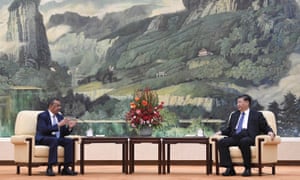
The World Health Organization struggled to get needed information from China during critical early days of the coronavirus pandemic, according to recordings of internal meetings that contradict the organisation’s public praise of Beijing’s response to the outbreak.
The recordings, obtained by the Associated Press (AP), show officials complaining in meetings during the week of 6 January that Beijing was not sharing data needed to evaluate the risk of the virus to the rest of the world. It was not until 20 January that China confirmed coronavirus was contagious and 30 January that the WHO declared a global emergency.
“We’re going on very minimal information,” said Maria Van Kerkhove, an epidemiologist and the WHO technical lead for Covid-19, according to the AP. “It’s clearly not enough for you to do proper planning.”
The WHO’s top official in China, Gauden Galea, said in one of the recordings: “We’re currently at the stage where yes, they’re giving it to us 15 minutes before it appears on CCTV [Chinese state TV].”
The report comes amid growing international scrutiny of China’s handling of the outbreak and moves to establish an independent investigation into the origins of the virus, which has infected more than 6 million and killed more than 375,000 people around the world.
The WHO has been criticised for consistently lauding China, even as questions emerged over the suppression of early warnings and information. The WHO chief, Tedros Adhanom Ghebreyesus, has praised China for “setting a new standard for outbreak response” in its swift and aggressive measures.
The WHO’s office in China did not respond to a request for comment on the recordings. It said in a statement, reported by the AP: “Our leadership and staff have worked night and day in compliance with the organisation’s rules and regulations to support and share information with all member states equally, and engage in frank and forthright conversations with governments at all levels.”
In early January, Michael Ryan, the WHO’s chief of emergencies, said he feared a repeat of the Sars epidemic in 2002, which Chinese officials initially covered up.“This is exactly the same scenario, endlessly trying to get updates from China about what was going on,” he said, according to the AP report. “The WHO barely got out of that one with its neck intact given the issues that arose around transparency in southern China.”
Ryan criticised China for not cooperating and advised for applying more pressure on Beijing. “This would not happen in Congo and did not happen in Congo and other places,” he said, apparently referring to the Ebola outbreak. “We need to see the data. It’s absolutely important at this point.”
Warnings and reports of a mysterious Sars-like virus began to filter out of Wuhan city in December but were suppressed by authorities. On 9 January, Chinese state media announced the illness was the result of a new coronavirus but said it was not contagious.
Almost two weeks later, officials admitted the virus was transmittable, as hospitals in the city were already flooded with patients and cases were appearing across the region. Authorities locked down Wuhan on 23 January, but at least 5 million residents had left, travelling across the country as well as overseas before the lunar new year holiday.


No comments:
Post a Comment